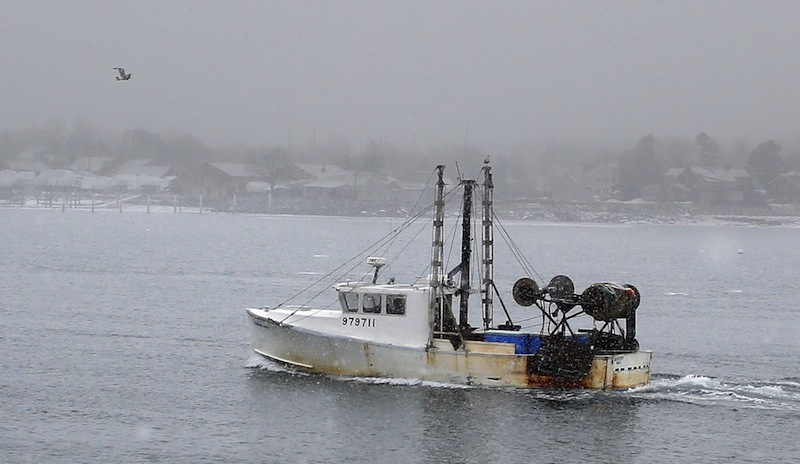AUGUSTA — Lawmakers are divided over a proposal to remove penalties for Maine-based groundfishing trawlers that catch lobsters in federally regulated waters.
The proposal, L.D. 1549, is designed to ensure that the state’s dwindling groundfishing fleet can keep the lobsters that come up in trawl nets and sell them in states that allow such lobsters to be landed.
Critics of the bill fear that it will lead to further loosening of restrictions on sales of incidentally caught lobsters, a practice the lobster industry fiercely opposes because of concerns about its impact on the state’s most valuable fishery.
The Legislature’s Marine Resources Committee endorsed an amended version of the bill last week, 7-6. The bill would lift the penalty for three years before triggering a legislative review. It could reach the Legislature as soon as this week.
Maine now prohibits sales of lobster bycatch, as does Canada. The state also penalizes commercial vessels licensed in Maine for landing or storing lobsters in Area 3, a federally regulated zone that extends from Maine to the mid-Atlantic states and begins about 40 miles off the Maine coast. The penalty can be as much as $50,000.
Commercial boats licensed in other states may keep lobster bycatch in Area 3.
The bill, sponsored by Sen. Anne Haskell, D-Portland, would remove the state penalty on Maine trawlers.
Haskell said the fine is punitive and could prompt the state’s remaining groundfishing boats to leave for out-of-state ports.
“It’s putting fishing licenses at risk because (commercial fishermen) are not allowed to possess (lobsters) on the boats,” Haskell said.
James Odlin, who owns and operates three groundfishing boats in Portland and two in Massachusetts, is one of the dozen or so fishermen who would benefit from the bill. Odlin has advocated for other bycatch legislation, including a proposal sponsored by Haskell that would have allowed Maine trawlers to land and sell lobster bycatch in Maine.
That proposal was unanimously rejected by the Marine Resources Committee, with strong opposition from the lobster industry. Haskell said the new bill is a compromise.
Odlin said the current penalty could prompt him to sell his Portland business.
“All that revenue generation will leave the state because I can’t ride around with a potential liability of $50,000 over my head,” he said. “No business can do that.”
The Maine Lobstermen’s Association didn’t take a position on the bill. Patrice McCarron, the group’s executive director, declined to comment.
Mike Dassatt, a member of the Downeast Lobstermen’s Association, testified against it, saying the bill’s goal of preserving the remaining groundfish fleet is not worth the risk of opening the door to further dragging.
“It’s 12 boats to 5,000 boats,” Dassatt said during Wednesday’s public hearing, comparing the size of the offshore groundfishing fleet with the state’s lobster boat fleet. “We have a whole state that relies on this lobster fishery.”
The issue puts the lobstermen’s associations in a difficult situation. Lobstermen generally say that lobsters shouldn’t be taken by drag fishing because it’s harmful to the long-term viability of the resource.
But the lobster industry is sensitive to the collapse of the groundfish fleet, which in Portland has supplied lobstermen with bait.
Rep. Wayne Parry, R-Arundel, a lobsterman, voted with the majority of the committee in favor of the bill last week. He said Friday that he’s “dead set” against dragging for lobsters but it behooves the lobster industry to ensure that Maine’s groundfishing fleet doesn’t disappear.
“We need to get those draggers back,” he said. “If we don’t do this, all those boats will go to Gloucester (Mass.). Once they go there, they may never come back.”
He said, “I want all the redfish Jimmy (Odlin) catches to be landed and processed in Portland. Everyone benefits from that.”
Advocates for L.D. 1549 say the bill would allow Maine-based fishermen to bring lobster bycatch only to states where it’s now allowed.
Maine’s Department of Marine Resources, which supports the bill, noted Wednesday that Maine-based trawlers violate state law for holding lobsters in Area 3 even if they intend to land them in other states.
Meredith Mendelson, deputy commissioner for the department, also told lawmakers that the department has difficulty enforcing the current prohibition because it’s unsafe for smaller Marine Patrol boats to venture so far offshore.
Jeff Nichols, a spokesman for the department, said Thursday that the Marine Patrol hasn’t done any enforcement focused on trawlers in Area 3 in the last five years.
Maine is the only New England state that prohibits sales of lobster bycatch from federally regulated waters.
Diane Cowan, senior scientist and executive director of The Lobster Conservancy, said there’s a reason that Maine and Canada prohibit bycatch. She said trawling for lobsters is harmful to the fishery, particularly brood lobsters, the large egg-producing females that migrate to deeper water.
Cowan told lawmakers that the bill is a crack in the door to an additional loosening of regulations. She urged lawmakers to keep the door shut.
“You need to work on the federal law to make sure there’s no dragging anywhere,” she said. “It’s not allowed in Canada, it should not be allowed in the U.S. Dragging for lobsters is wrong.”
Final language of the bill is expected to be drafted next week before going to the Senate for a preliminary vote.
Steve Mistler can be contacted at 620-7016 or at smistler@pressherald.com
Send questions/comments to the editors.



Comments are no longer available on this story